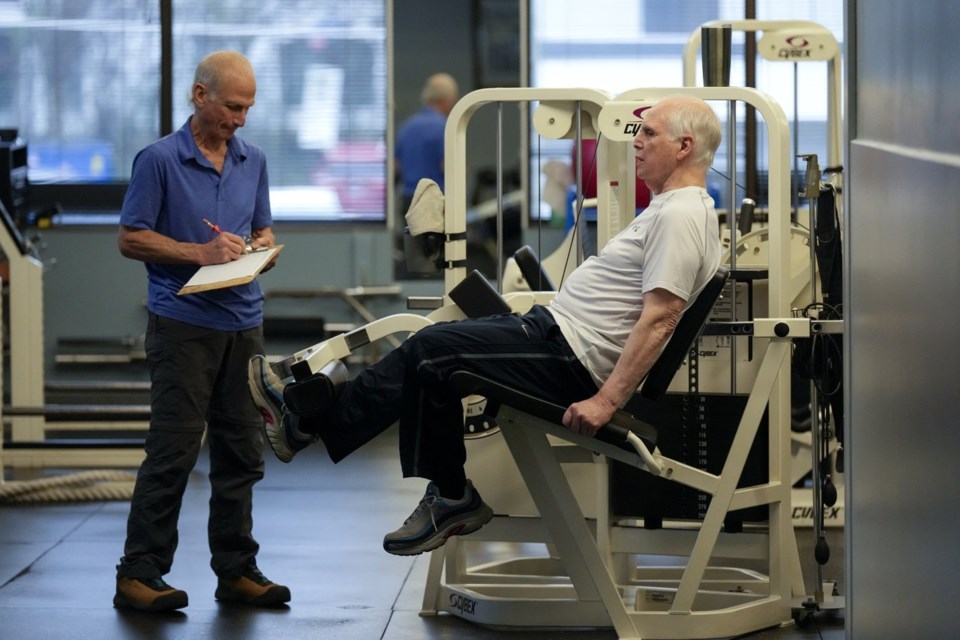You know you should develop a regular exercise routine, but you lack motivation. Promises to yourself are quickly broken, and you never establish enough of the workout habit to experience any rewards.
Exercising as you age is important. It's not only good for physical health to help prevent falls or enable you to do basic tasks — exercise is also superb for the mind.
“If you want to be cognitively active, it is so important to be physically active,” explained Dr. Amy Eyler, a professor of public health at Washington University in St. Louis. “There is a such a strong connection between these two behaviors.”
Why make exercise part of my routine?
First, regular exercise helps . It also lowers the risk of heart disease and certain types of cancer.
For older people, regular exercise helps maintain strength and balance and allows them to live independently. Research also suggests the immune system may get a bump from physical activity.
There is also a psychological component. Successfully completing a daily exercise can improve one's mood and sense of self-satisfaction.
How to get started
Getting into the habit of doing regular physical activity can be difficult for some. The motivation to get moving is different for everyone.
Initially you’ll need external motivation — I want to be able to play with my grandkids or keep driving the car — until you see results and the motivation shifts to internal, Eyler said.
“When you set a goal, you should ask yourself on a scale of 1 to 100, how confident am I that I can do this?” Eyler explained. “It has to be over the 90% level of confidence or you’re not going to do it. Lots of people set these goal too high and then fail."
Build to your goals.
“Just walk whenever you can,” Eyler said. “You can walk for 10 minutes pretty much anywhere — indoors, at work, at home.”
And, if you’re trying to encourage others, look for positive reasons rather than nagging.
“Telling someone they will be more independent if they take their blood pressure medicine is better than — take your blood pressure medicine,” she said.
Here are some tips about how to start — and how to stay with it — from three gym rats between the ages of 77 and 86. All got started late and have stayed with it. All three work out with Dr. Irv Rubenstein, an exercise scientist who runs in Nashville, Tennessee.
I always hated gym class
Kathryn Dettwiller, 77, got pushed into exercising 34 years ago by her husband.
“I always hated gym class,” she said. “I always hated getting down on the floor.”
She works out in a gym twice a week with a trainer, which she said gives her added discipline and motivation.
“The external has become internal because I realize I need it,” she said. She cautioned beginners to expect some setbacks — minor injuries — and not to be discouraged.
“Try it as soon as your body starts playing out on you,” she said. “It's like a game of Whack-A-Mole. One time your leg hurts, the next time it’s your back.”
It added structure to his life
Rick Bolsom, 82, enjoys the structure of having a trainer. In his case, his wife got him started almost two decades ago and he's into a three-times-a-week routine.
“I kept doing it because I had a sense of feeling better,” he said. "The key to me was probably doing it with a trainer. The structure really helped me to continue with it. Now it’s just become part of my life.”
“I couldn't imagine quitting it,” he added. “I work out as vigorously as I did 15, 18 years ago. It turned out to be the smart thing to do.”
Bolsom also added in the social aspect to training in a gym or studio.
“I retired a few years ago. You do miss the connectivity with people.”
Flattery will get you everywhere
Dr. Grover Smith, a retired radiologist, is 86 and still going strong. He attributes this partly to training regularly in a gym three times a week, a habit he didn’t start until he was 74 and well into retirement. He was coaxed to go after several visits to his cardiologist.
He said he went after the fourth time his cardiologist suggested it, although he was not having any specific heart problems. His plan was to go once to appease the cardiologist and that would be it. That was more than a decade ago.
“Medicine was basically my life and it was very time consuming,” Smith said. “It was sometimes seven days a week and I didn't have time for a lot of other things.”
He's not only fit, but now he also gets flattered.
He tells the story about a recent visit to a doctor who, after looking at his charts, told him: “Dr. Smith, you look 15 years younger than your age.”
Smith laughed as he added the punchline.
“I would have told her to get her eyes examined — except she’s an ophthalmologist,” he quipped.
Stephen Wade, The Associated Press




